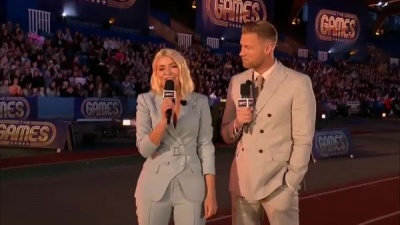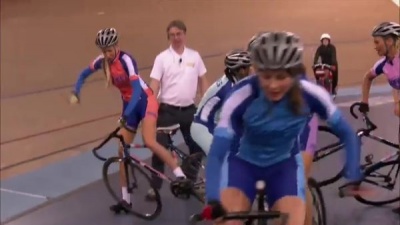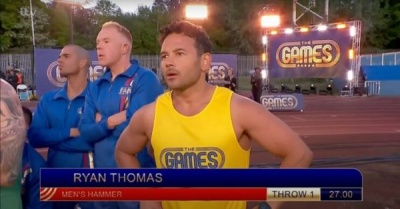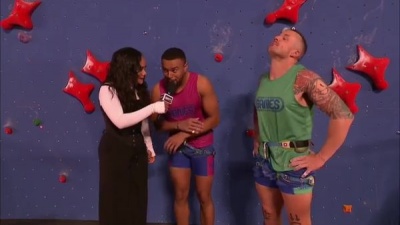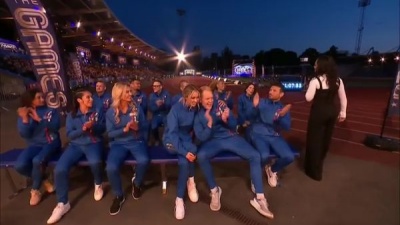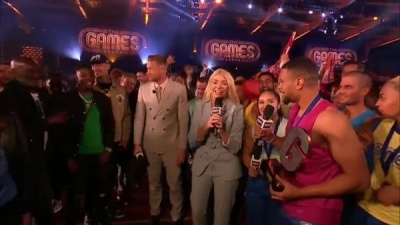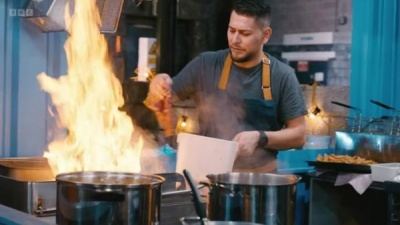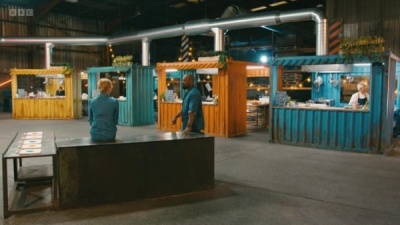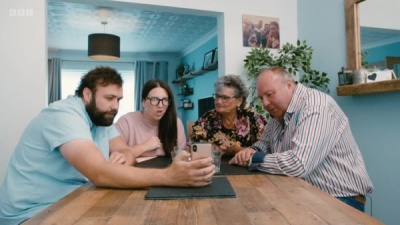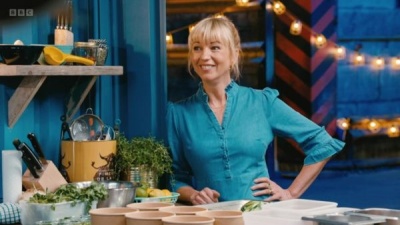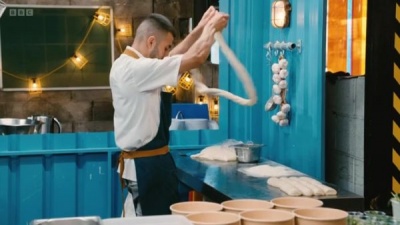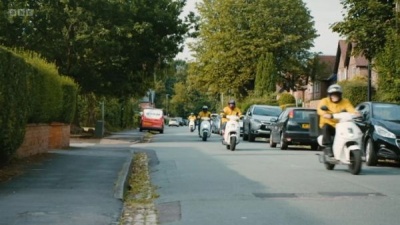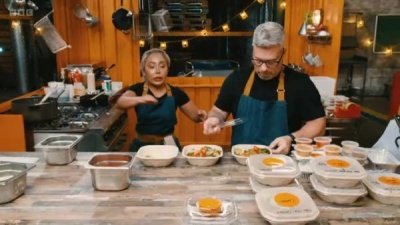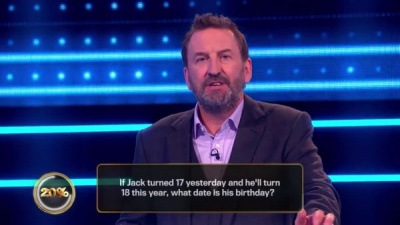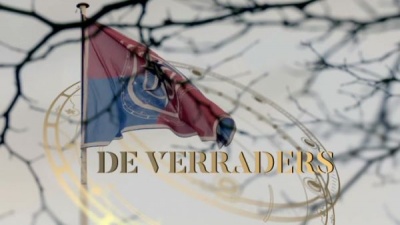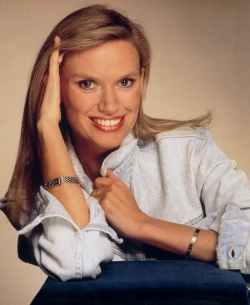Weaver's Week 2022-05-29
Last week | Weaver's Week Index | Next week
"There are those who claim that the days of reality television are numbered, and that their influence is on the wane. This is of course pure guff." – Jack Kibble-White, 2003.
Contents |
The Games
Initial (a Banijay company) for ITV, 9-13 May
Almost twenty years ago, Channel 4 had a successful strand called The Games. A dozen C-list celebrities were trained in various sportsy events, and put to the test live on television each night for a week. The show was as much about taking part as winning, and a good chunk of each programme was taken up with the camaraderie between the contestants. The Games was where we found out that Harvey from So Solid Crew was the fastest man in pop, that Mel Giedroyc really was as much fun as we hoped, and that Peter Duncan was still brilliant at diving.
The Games last took place in 2006, Channel 4 had other priorities in their eye. There have been rumours of it coming back every so often, and a planned revival in 2020 was scuppered only by the pandemic. ITV kept the idea under review, and The Games finally came back earlier this month.
For those of us old codgers who saw the original series, surprisingly little had changed. The main host was still a proper television star – Holly Willoughby now, Jamie Theakston then. Both are experienced in the unpredictable world of live television through a proper training on Saturday mornings with an incomprehensibly popular co-star (Mr. Blobby and Stephen Mulhern). The trackside reporter is a rising star (Jayne Middlemiss to Alex Scott), and the commentary comes from some of the finest voices (Simon Brotherton and Chris Kamara now, David Goldstrom back in the day).
The events were a welcome mixture of sports. Running and javelin, yes, but also swimming, diving, cycling, weightlifting, and the new sport of climbing. The scores were kept in the traditional way, lots of points for winning, not much for the last finisher. Didn't there used to be a point for beating your personal best in the live final? There was, and now there isn't.
That wasn't the only thing The Games 2022 lacked. Dobs Vye's pounding, pulsing soundtrack has gone for a burton – A-Mnemonic's work is contemporary, Dobs's is timeless. The Games 2022 lacked that camaraderie, the sense that everyone is pulling together. We could have sworn they used to spend a good chunk of time showing the contestants living together, in their isolated village at the Sheffield Don Valley Stadium (now the Don Valley Bowl park). While we still get plenty of footage from training, everything is now about the competition, and the competition is all.
The opening episode of any series was always difficult, lots of people to introduce, and a chunk of sport to show. But this series really got off to a horrible start, three events in a 90 minute programme wasn't enough performance to satisfy the sports fan, and too much unfocussed discussion for the casual viewer. We had to make an effort to keep watching the show, we came away from the opening night drained rather than inspired.
To be fair, things improved as the week went on. The graphics package improved – gold on red is a nightmare to see, gold on navy blue is better, though live graphics never became particularly readable. Alex Scott found her groove as the on-track reporter, asking the right question to bring out what the performer wanted to say.
A lot of events were pre-recorded. Synchronised diving, which we think is the first time they've tried to have a joint event between men and women. The climbing events were taped, as was the javelin and hammer, some canoe slalom, and the entire weightlifting competition was recorded. Having seen live weightlifting on the pay-tv sports channels, this last one was the right decision.
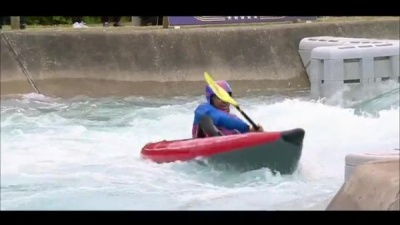 White water canoeing was brilliant on Paddles Up, a bit flat here.
White water canoeing was brilliant on Paddles Up, a bit flat here.
Co-commentator Chris Kamara came in for some stick owing to his apraxia, a condition that makes speaking difficult and is particularly unfortunate for a broadcaster. Let's not be beastly, Chris added plenty of astute observations and was worth the booking. We wish him well in his retirement. Studio guests were as varied as we'd expect, from the useful Daley Thompson to the present Yung Filly.
Viewers responded in the expected way: find something else to do instead. The 90-minute first episode pulled in 2.65mn viewers, the rest of the week bobbled around 2 million. Perhaps it would have helped if the show had been trimmed down: recorded a little earlier in the evening and edited down to elide some of the transitions. There was a lot of talking with the sports experts, and not much talking with the competitors.
And yet, watching the episodes back to back, we can see that the show still has its heart. Celebrities push to produce their best, learn new skills, perhaps inspire you to take up something new. Perhaps they didn't concentrate enough on the internal struggle, competitor versus themselves. They didn't have a stellar line-up, they didn't give the show much hype, they did get a reasonably fulfilling show.
Will The Games be coming back? On those numbers, perhaps not. But if ITV is prepared to treat this series as a trial run, and build up to the next series, perhaps it could. We hope for a few slightly bigger names: can they persuade Darragh Ennis to take part? The Fabulous Iain Stirling? Scarlett Moffatt, who is up for anything?
Back in 2003, Off The Telly pointed out that there was no real audience interactivity on The Games. Truth to tell, it never needs it – the drama comes from the competition, both amongst each other and with each person against themselves. We're glad that ITV didn't add a needless phone vote, or other frivolous interactivity.
Top Takeaways
Ricochet for BBC2, 9-19 May
Or, as it was billed in the hashtag, #britainstoptakeaways. "Britain! Stop takeaways! What anti-social madness is this?!" No, not another stunt by Jamie Oliver, the only person in the world who believes that the way to solve things right now is to remove pleasant food and put prices up. Let this be a lesson, use camel case – it saves confusion. Make it #TopTakeaways, let's not have another Susan album party.
The aim of Top Takeaways is to celebrate the greatest takeaway food, not close it down. Sara Cox hosts the program, with some nebulous assistance from Darren Harriott. Each show concentrates on a different sort of takeaway food – they began with fish and chips, went through Chinese and Mexican and kebabs and pizza and chicken, and we're taking pictures from Noodles Night.
Five takeaways relocate to the cooking centre in downtown Manchester, usually two-person operations. We get to see a little of their daily life, a few testimonials from satisfied customers. Most of the programme is the team cooking for customers, and the customers passing judgement on their orders.
Ah yes, the customers. One family orders a single item from each team's menu. Another family orders a different item from each menu. Their orders are processed, and delivered. They eat the grub, and pass judgement. Repeat for a second set of families, ordering more adventurous dishes. Repeat with one last family, and a massive order – a local group, like a rugby club, who want one of everything on the menu.
Scoring is simple, and identical to The Games: one point for the bottom performance, two points for the next best, up to five points for the top. The big order at the end plays for double points, so the final result is always in doubt until the end. The winners get the prestige of winning. And that's all they get – there's no prize, not even a Perspex trophy.
The best news: the contestants are really good at what they do. One fish batter contained a dash of prosecco, another serves a "chip butty" in a brioche with a rocket salad. We had a takeaway offering genuine pork noodles, and the simple "drunken noodles" with plenty of spice.
Sara Cox asks the easy questions in an interesting way. You know how we laugh at sports commentators because they always ask, "how does it feel to have won / lost / bellyflopped into the pool?" Coxy's questions are similarly banal, "what is that? It looks like thin custard", but they're exactly the right questions to bring out the points quickly and clearly. Hosts on the other sides could take notes.
The families at home are a variable lot. Some of them are characters who threaten to overpower their segment; some are passers-by who wouldn't entertain if they were on a stage with Ant and Dec. This isn't the casting from The Button or even from Gogglebox. But we do get to see the families talking with co-host Darren Harriott. While Coxy is working in the kitchens, Darren packs up the orders and reports the scores.
What public service remit does Top Takeaways serve? It reflects the way the culture consumes food in the present zeitgeist. It's not cooked by the family, but by experts, and delivered on the back of a motorbike. Because it only showcases the best takeaways, the show demonstrates what can be achieved. There's a subtle pressure for your local takeaway to improve its work, perhaps take a few ideas from the relevant show and play around with them.
In this column's view, Top Takeaways wasn't right for a one-hour programme. There are a lot of people to meet: five takeaways, six families or other groups. Even excluding the big group at the end, that's something like thirty faces, someone new turning up every two minutes. And we don't need to remember any of them at the end of the show.
We wonder, would this show have been better as three half-hour editions? Meet some of the teams, give the first order. Meet the rest of the teams, deal with the second order. And the final day, recap what we've seen, and the big rush. In the one-hour format, Top Takeaways is hectic, confusing, and draining to watch.
As it is, we found ourselves skipping around in the show: the first part to meet the players, the big order at the end. And when we regularly skip through bits of the show, we're missing something.
It's rare that we find a programme too short – the modern trend seems to be to squeeze a 35 minute programme into a one-hour slot. Top Takeaways is that exception, a show that's just a bit faster and more superficial than we'd like. There's a very watchable format somewhere around here, but not in this execution.
In other news
That's rich! Viewing figures for the Eurovision Song Contest are out. 161 million people across Europe saw at least three minutes of the show. Ratings for the NFL's Superb Owl sportsball game are around three-quarters as big. On the BBC, an average of 9.3 million people watched the programme – that's averaged across all 4 hours 12 minutes. Peak audience was around 12 million, the sort of figures not seen at midnight since the heyday of Steve Davis and Dennis Taylor.
A word on The 1% Club and its ratings: stupendous. Six episodes in, and it's averaging 4.35 million viewers – of this year's new programmes, only Limitless Win has a better average, and only by a quarter-million. No surprise that it's been recommissioned, and adapted into Dutch.
Spot the traitor Claudia Winkleman will host The Traitors, a very BBC version of De Verraders. A few contestants, the titular "traitors", are told how to win the challenges; a larger number of contestants are uninformed. Overnight, one of the uninformed players is removed by the few in the know; a democratic decision removes another player later in the day. Any knowing traitors surviving to the end will scoop the jackpot, otherwise it's split between the innocent majority. Other elements may come into play.
We've tried to watch the Dutch original, it's a bit too wordy for us to comprehend what's going on without subtitles, and our attempt at a write-up was a lot of flapping and asking "what is happening". The first series took a couple of episodes to catch light, then smouldered with a comfortable warmth.
We are intrigued to see how this BBC version works: with a potential prize of £120,000 (145 000€), it's got to be primetime BBC1. With the content and tone, we wouldn't air it before 8pm: it's not rude, but it's dark. The Traitors doesn't have a huge playalong factor, it's a whodunnit where we know who's doing it. We're ... intrigued.
Start the clock! Anneka Rice is coming back on your screens! The energy-packed star is in a new run of Challenge Anneka for Channel 5. In this series, Annie will cajole, persuade, entice, and encourage people to donate goods and effort to do something amazing for a community. The series originally ran on the BBC about 35 years ago, and had a brief revival on ITV in the mid-aughts.
Morning all The Big Breakfast is coming back to Channel 4, still hosted by AJ Odudu and Mo Gilligan. Except... it's a Saturday morning show, so more in the vein of SM:Going Mash and Kick-Up for adults.
How do you cast a quiz giant? Sue Allison, original producer on The Chase, explains how they got The Beast and The Dark Destroyer on board. She also tells a cracking story about Hole in the Wall. That was on the Show and Telly Podcast at the start of the week, and picked up by The Sun, Mirror, Star, and others. Hear it first: listen to the podcast!
Awards season continues, with Broadcast magazine's digital awards. Confusingly, they're presented at an in-person event on 5 July, and not by trophy-over-IP. Game shows are nominated in two categories:
- Best Digital Support – BBC Eurovision 2021, Strictly Come Dancing, The Masked Singer
- Entertainment – Never Mind the Buzzcocks, RuPaul's Drag Race
The late-May traditions are back. It's the Got Talent live semi-finals (VM1 and ITV, from Monday; final's next Sunday). All Day Popmaster returns on Bank Holiday Monday (Radio 2, Thursday). A new series of Five Dates a Week is stripped across three nights (C4, Sun-Tue; also Sun 5 June). Come Dine with Me and Drawers Off have new series (C4, weekdays).
We won't publish next week, so watch out for Love Island and Celebrity Karaoke Club (ITV2, Monday 6th). Am Dro! (S4C, Sunday 5th) is back, as are Cooking With the Stars (ITV, Tuesday 7th) and The Bridge (C4, Tuesday 7th). This is My House (BBC1, Friday 10th) continues.
ITV's Soccer Aid has editions of Tenable (Wed 8th), Tipping Point (Thu 9th), and Shaun Williamson returns to The Chase (Fri 10th). They've also Millionaire Celebrities (Fri 10th).
Pictures: Initial (a Banijay company), Ricochet, Magnum Media, IDTV, Clemmie Hart.
To have Weaver's Week emailed to you on publication day, receive our exclusive TV roundup of the game shows in the week ahead, and chat to other ukgameshows.com readers, sign up to our Google Group.


